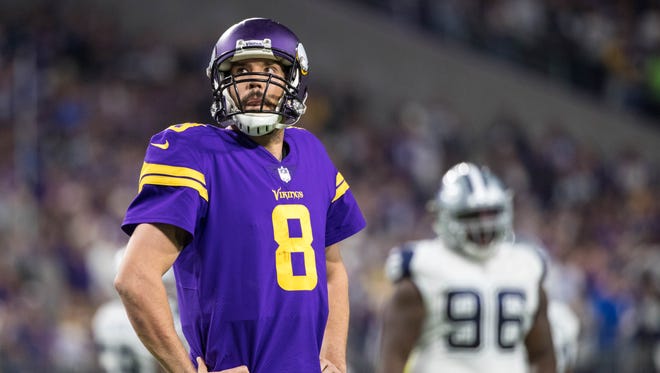Can NFL keep pushing back on reviews for penalties after no-call costs Vikings?

MINNEAPOLIS – Brandon Fusco was on his way out of the Minnesota Vikings’ locker room Thursday night when he was shown video of Dallas Cowboys defensive tackle Cedric Thornton’s right hand smacking Sam Bradford’s facemask on a late, failed 2-point conversion.
“Oh, my gosh!” exclaimed Fusco, the Vikings’ soft-spoken guard. “They shouldn’t have missed that. I didn’t realize it was that bad.”
On the other end of the room, Vikings defensive end Brian Robison ranted that he’s “sick and tired of the reffing in this league right now” and singled out the hit on Bradford, who could be seen asking referee Tony Corrente for a flag after a play that all but sealed the Cowboys’ 17-15 win.
What was Corrente’s explanation?
“He told me that I did not get hit in the facemask,” Bradford said, making a face that conveyed his incredulity at the answer.
NFL playoff picture: Packers-Lions showdown could be play-in game
And this is where the question needs to be asked, again:
How much longer can the NFL push back at the idea of allowing plays like this – specifically, called or uncalled penalties at critical junctures of the game – to be subject to replay review, allowing officials and the league office to get it right based on the same video 66,860 fans in the stadium and millions more at home get to see almost instantly?
Officials’ jobs are only getting tougher in the world of high-definition television. Every armchair referee gets a dozen angles, zoomed in, with super slow-motion and freeze frames, not one glance in real time that can be obscured by some of the 22 bodies colliding everywhere.
It makes sense to limit the number of reviews to prevent games from becoming unreasonably long. Plus, there’s built-in subjectivity to many penalties – judgment calls such as whether a blocker “materially” restricts a pass rusher to justify a holding call or, in the case of the hit on Bradford, whether a defender “forcibly” makes contact to the quarterback’s head.
But in a high-leverage situation, in a game with playoff implications, on national TV no less, wouldn’t it make sense to have some mechanism to correct a seemingly obvious error?
“Especially what’s at stake at that time in the game,” Fusco said. “I think it’s something that should be worth looking at.”
NFL Week 13 picks: Steelers vs. Giants highlights first December games
It was a matter of debate last year, when the infamous illegal bat in Seattle gave the Seahawks a controversial win against the Detroit Lions. The uncalled hit on Bradford revived memories of a missed facemask on Green Bay Packers quarterback Aaron Rodgers in an epic playoff game at Arizona after the 2009 season, yielding a walk-off strip-sack touchdown.
New England Patriots coach Bill Belichick has advocated for letting coaches challenge whatever they want, including penalties. The Buffalo Bills made a proposal at the league meetings in March to let coaches challenge any official’s decision except scoring plays and turnovers (which are reviewed by the replay booth under the current rules). It went to a vote and failed.
Rich McKay, chairman of the NFL’s competition committee, said then that the driving concerns include rewriting the rule book to be officiated in replay and “substituting one person’s judgment for another. They’re managing a game and officiating the game at full speed.” Pace of play and the mechanics of reviews inside two minutes have also been raised as concerns in the past.
The hit on Bradford came with 25 seconds left, so any review would’ve had to come from the replay booth, not a challenge. But there’s nothing in the rules to make that happen, even though Thornton himself didn’t exactly deny he might’ve gotten away with one.
“I’m going to let y’all write what y’all want to write,” Thornton said, then added repeatedly: “We won the game.”
It wasn’t the first borderline hit Thursday on Bradford, who briefly left the game before halftime after Cowboys defensive tackle Maliek Collins rammed the top of his helmet into Bradford’s ribs.
Even Robison said he didn’t blame officials for the outcome Thursday. The Cowboys were flagged for 10 penalties, including a questionable holding call on right tackle Doug Free that wiped out a 43-yard Ezekiel Elliott run in the first quarter. Had the Bills’ rule passed, that call could’ve been challengeable, too.
A flag on Thornton only would’ve given the Vikings another shot at the conversion from 3 ½ yards, after right tackle Jeremiah Sirles’ false start had backed them up. Officials might have missed another false start by left tackle T.J. Clemmings on the same play Bradford got hit – also not reviewable.
There’s no easy answer here. Nobody wants the game stopped after every snap to search for fouls. But it’s unfortunate the conversation about an excellent game once again will include a flag that wasn’t thrown and an official’s explanation that flatly contradicts what everyone with two eyes and a TV saw.
Follow Tom Pelissero on Twitter @TomPelissero.
PHOTOS: Best of NFL Week 13
